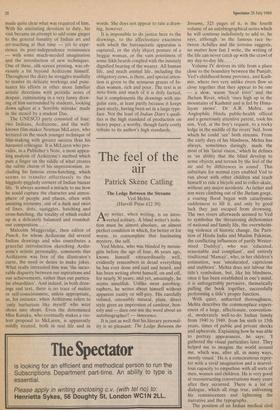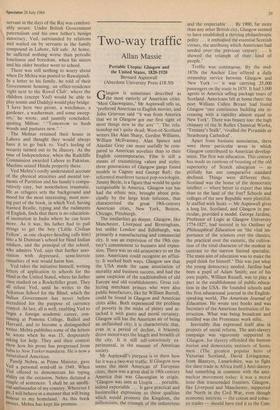The feel of the air
Patrick Skene Catling
The Ledge Between the Streams Ved Mehta (Harvill Press £12.50) Ay writer, when writing, is an intro- verted solitary. A blind writer's isola- tion must be almost absolute, an almost perfect condition in which, for better or for worse, to contemplate that fascinating mystery, the self.
Ved Mehta, who was blinded by menin- gitis before the age of four, 46 years ago, knows himself extraordinarily well, evidently remembers in detail everything he has ever done and said and heard, and has been writing about himself, on and off, for nearly 30 years; and yet, amazingly, he seems unselfish. Unlike most autobiog- raphers, he writes about himself without apparent vanity or self-pity. His carefully refined, ostensibly natural, plain, direct style gives an impression of candour, hon- esty and — dare one use the word about an autobiographer? — innocence.
It is just as well that his literary personal- ity is so pleasant: The Ledge Between the Streams, 525 pages of it, is the fourth volume of an autobiographical series which he will continue indefinitely to add to, he says, although 'as the famous race be- tween Achilles and the tortoise suggests, no matter how fast I write, the writing of the life can never catch up with the crawl of my day-to-day life. . . '
Volume IV derives its title from a place close to the boundary between the Punjab, Ved's childhood home province, and Kash- mir, where two very unlike rivers flow so close together that they appear to be one — a slow, warm 'local river' and the Jhelum River, which 'rises high up in the mountains of Kashmir and is fed by Hima- layan snows'. Dr A.R. Mehta, an Anglophile Hindu public-health official and a generously attentive parent, took his son, Ved, at the boy's request, to a rocky ledge in the middle of the rivers' bed, from which he could 'see' both streams. From the early days of his blindness, Mehta has always, sometimes daringly, made the most of his 'facial vision,' which he defines as 'an ability that the blind develop to sense objects and terrain by the feel of the air and by differences in sound'. This substitute for normal eyes enabled Ved to run about with other children and teach himself to ride a bicycle and to roller-skate, without any major accidents. As father and son were climbing out of the Jhelum gorge, a roaring flood began with cataclysmic suddenness to fill it, and only by good luck they just escaped from drowning. The two rivers afterwards seemed to Ved to symbolise the threatening dichotomies of national and family life, the overwhelm- ing violence of historic change, the Parti- tion of Hindu India and Muslim Pakistan, the conflicting influences of partly Wester- nised `Daddyji', who was 'educated, reasonable and compliant', and entirely traditional 'Mamaji', who, in her children's estimation, was 'uneducated, capricious and stubborn'. Mehta does not labour the title's symbolism, but, like his blindness, once it has been established in one's mind, it is unforgettably pervasive, thematically pulling the book together, successfully performing a title's proper function.
With quiet, unhurried thoroughness, Mehta describes the commonplace experi- ences of a large, affectionate, convention- al, moderately well-to-do Indian family from 1940 to 1949, from his sixth to 15th years, times of public and private shocks and upheavals. Explaining how he was able to portray appearances, he says: 'I gathered the visual particulars later. They helped me to imagine the world around me, which was, after all, in many ways, mostly visual.' He is a conscientious repor- ter with a vivid imagination and a marvel- lous capacity to empathise with all sorts of men, women and children. He is very good at reconstructing conversations many years after they occurred. There is a lot of dialogue, which all rings true, enlivening his reminiscences and lightening the narrative and the typography.
The position of an Indian medical civil servant in the days of the Raj was comfort- ably secure. Under British Government paternalism and his own father's benign autocracy, Ved, surrounded by relations and waited on by servants in the family compound in Lahore, felt safe. At home, he suffered nothing worse than periodic loneliness and boredom, when his sisters and his older brother went to school.
There was still nothing to worry about when Dr Mehta was posted to Rawalpindi. In a letter to his family, he told of their Government housing, an office-residence 'right next to the Rawal Club', where the children (except Ved) would be able to play tennis and Daddyji would play bridge. 'I have here two peons, a watchman, a gardener, a washerman, and some sweep- ers,' he wrote, and jauntily concluded, quoting Milton: —Tomorrow to fresh woods and pastures new." '
The Mehtas retained their house in Lahore and thought they would always have it to go back to. Ved's feeling of security turned out to be illusory. At the time of Independence, when the Radcliffe Commission awarded Lahore to Pakistan, Muslims seized Hindu property there.
Ved Mehta's coolly understated account of the physical atrocities and mental tor- ments of Partition and his family's compa-. ratively easy, but nonetheless traumatic, life as refugees sets the background and mood for the most interesting, most mov- ing part of the book, in which Ved, having learned Braille, typing and the rudiments of English, finds that there is no education- al institution in India where he can learn more. As it was, his father had to pull strings to get the boy ('Little Civilian Fellow', as one chapter-heading calls him) into a St Dunstan's school for blind Indian soldiers, and the principal of the school, who admires Ved, says that further asso- ciation with depressed, semi-literate casualties of war would harm him.
Ved takes the initiative himself, writing letters of application to schools for the blind in the United States, where his father once studied on a Rockefeller grant. They all refuse Ved, until he writes to the Arkansas School for the Blind, which the Indian Government has never before accredited for the purpose of currency control. At last, all is well, enabling Ved to begin a foreign academic career, con- , tinuing at Pomona College, Balliol and Harvard, and to become a distinguished writer. Mehta publishes some of the letters ; he wrote when he was 15, desperately asking for help. They and their context show how his prose has progressed from babu to New Yorker mandarin. He is now a naturalised American.
Pandit Nehru, as Prime Minister, gave Ved a personal send-off in 1949. When Ved offered to demonstrate his typing ability on the occasion, Nehru dictated a Couple of sentences: 'I shall be an unoffi- cial ambassador of my country. Wherever I go, I will behave in a manner that will bring honour to my homeland.' As this book proves, Mehta has kept his promise.











































 Previous page
Previous page